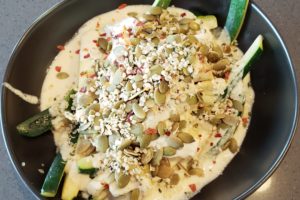I recently visited a relative who made a delicious recipe that included chicken. While preparing the chicken, this person took the chicken out of the store’s packaging and proceeded to rinse it in the sink. I immediately became concerned. To this person, washing the chicken in the sink was going to help clean the chicken. What this person didn’t know is that washing meat in the kitchen sink doesn’t actually clean the meat and is a major avenue for spreading a food borne illness in your home.
“I sanitize my kitchen after prepping my food, so what’s the big deal?” According to the FDA there are about 48 million cases of food-borne illness in the United States each year (FDA, 2016) and about 3,000 of those cases result in death (PubMed Health, n.d.). These numbers are also probably a gross underestimate because most people don’t seek medical care unless the symptoms become severe (Drexler, 2010). By washing meat products in the sink, you end up infecting your sink in a process called cross contamination (USDA, 2013). If you care for an elderly parent or a young child, since their immune systems are more susceptible to infection you may be putting them at an unnecessary risk. While you may not be in direct danger, your household may be.
When you rinse meat in your sink, you increase the likelihood that bacteria will get on your kitchen counter, nearby utensils, your kitchen faucet, the recipe book or smart device you are using to construct your meal, and most likely, your dish towel (Kansas State University, 2015). This typically happens when contaminated droplets splash around the area you are rinsing the meat. The reason the dish towel gets contaminated is by touching it after you handled the meat but before you washed your hands. In most cases, this happens reflexively and we don’t even realize we are doing it (Kansas State university, 2015).
This reminds me of a microbiology lab that I took for my undergraduate degree. In the class I had to take swabs of various surfaces throughout my home including the kitchen sink and inside the toilet bowl. I took a sample from inside my garbage disposal and the results showed that the kitchen sink was more contaminated with bacteria than any other surface in my home, including my toilet bowl. Upon reading this you might feel repulsed and think “this guy is gross,” and when I got those results I thought long and hard about this as well. “How could my kitchen sink have more bacteria than my toilet bowl? I clean and disinfect it regularly.” If you are thinking that, you may be surprised to hear that this situation is actually very common. One reason for this is how much we use our kitchen sink, including rinsing meat in the sink.
The fact is, there is no logical reason to wash meat before you cook it. It doesn’t help prevent illness but instead increases the likelihood of getting sick. Even while washing meat some bacteria can still cling to the meat (USDA, 2013). If some bacteria clings to the meat, then what is the point of washing it in the first place? It can be difficult for us to think about because we want to do our best to keep our friends and family from getting sick and everything we have been taught tells us washing something makes it clean. We have to remember that the bacteria in our food won’t be killed by rinsing.
When we wash our hands with soap and water we are not actually killing any bugs. What we are doing is washing away the oils, dirt, and dead skin cells that bacteria cling to on our hands. If you are using an antibacterial soap, I would recommend you start using regular soap. There is concern that the chemical in antibacterial soaps that kills bacteria, triclosan, causes health problems when used over a lifetime (US FDA, 2016). It’s a sad irony that the very chemicals we are using to make our home safer, are actually causing health issues later in life. Unless you are spraying a disinfecting agent directly on your meat while washing it, which is a surefire way to end up poisoning yourself, you are not actually killing any bacteria on the surface of the meat. The only way to disinfect meat prior to consumption is by cooking it.
What can you do to prevent cross contamination?
In addition to not rinsing meat, an easy change you can make is to prep meat after prepping the rest of the meal’s ingredients. Not only will this help keep contaminated meat droplets from getting on the rest of your food by accident but it will also help create a better cooking experience. No more rushing to chop certain veggies in time to make sure you don’t burn the rest of the meal. If you’re like me you have overcooked chicken in a stir fry many times because you were rushing to get your veggies chopped up. Another simple thing you can try is to use a dedicated knife and cutting board when preparing meat. This helps limit the items that will need sanitation post prep. Finally, when handling raw meat, if you have to turn on your faucet, use a paper towel that you can immediately trash so you don’t contaminate the area around your faucet.
References:
Drexler, M. (2010). What You Need to Know About Infectious Disease. National Academies of Science. Retrieved from: https://www.ncbi.nlm.nih.gov/books/NBK209711/
FDA. (2016). Foodborne Illnesses: What You Need to Know. Retrieved from: https://www.fda.gov/food/foodborneillnesscontaminants/foodborneillnessesneedtoknow/default.htm
Kansas State University. (2015). Towels top kitchen contamination hazards list. ScienceDaily. Retrieved from: www.sciencedaily.com/releases/2015/03/150318144502.htm
PubMed Health. (n.d.) Food Poisoning (Foodborne Illness). Retrieved from: https://www.ncbi.nlm.nih.gov/pubmedhealth/PMHT0028136/
USDA. (2013). Washing Food: Does it Promote Food Safety? Retrieved from: https://www.fsis.usda.gov/wps/portal/fsis/topics/food-safety-education/get-answers/food-safety-fact-sheets/safe-food-handling/washing-food-does-it-promote-food-safety/washing-food
US FDA (2016). Antibacterial Soap? You Can Skip It – Use Plain Soap and Water. Retrieved from: https://www.fda.gov/ForConsumers/ConsumerUpdates/ucm378393.htm







